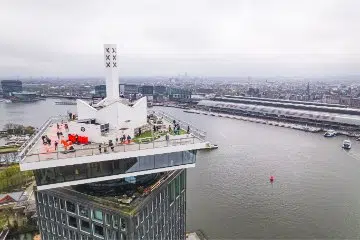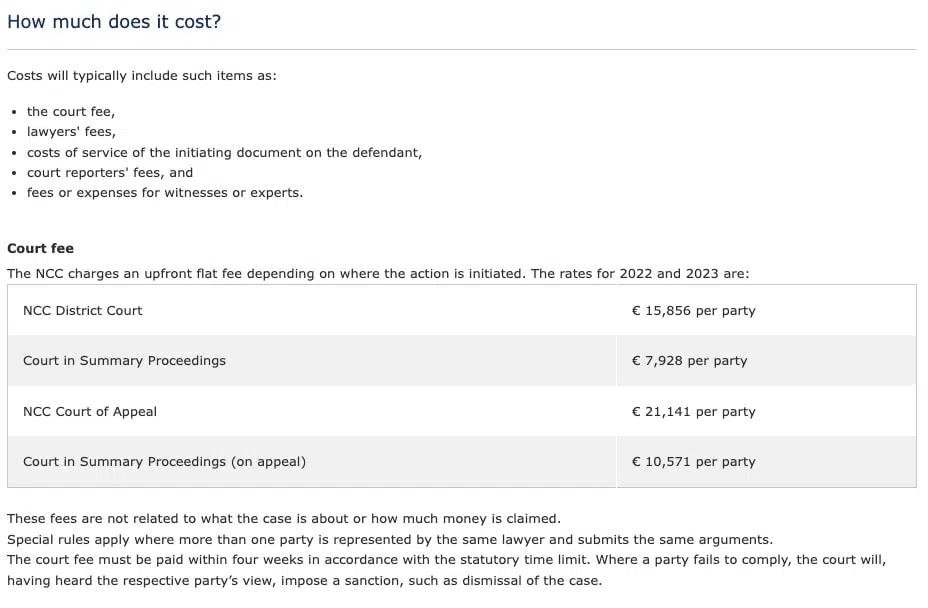
In the realm of legal proceedings in Holland, the legal costs and fees in the Netherlands associated can often be as important as the proceedings themselves. This is particularly true in the Netherlands, where understanding the nuances of legal costs and fees is crucial for the effective navigation of the Dutch legal system. This includes everything from understanding how Dutch litigation lawyers are remunerated, often via hourly rates, to the additional Dutch court fees that can vary widely based on the type of case and parties involved. Furthermore, the Dutch legal system has a unique feature where the losing party typically bears the brunt of the costs, adding another layer of complexity to the financial dynamics of legal proceedings. With such inherent complexity, it becomes essential to thoroughly explore and decode the financial aspects of the Dutch legal system.
Key Takeaways
- Costs associated with legal proceedings in the Netherlands can have financial implications.
- The Dutch court fees for claims above € 1,00,000 for legal entities amount to € 6,617 in 2024.
- Legal costs and fees vary depending on the type of proceedings in the Netherlands and the entities involved.
- The losing party typically bears a part of the costs in the Dutch legal system (via a formula).
- Alternative conflict resolution methods, like mediation, can help avoid Dutch court costs.
Dutch Court fees overview
Please find enclosed an overview of the court fees in the Netherlands for 2024. This list will give you detailed information about all the civil court fees, excluding the fees for the NCC (Netherlands Commercial Court).
Understanding Legal Proceedings Costs in the Netherlands
How do the costs associated with different types of legal proceedings in the Netherlands, such as court fees, lawyers’ fees, and other associated costs, impact individuals and legal entities involved in these proceedings? The financial implications can be significant. Legal costs and fees in the Netherlands vary depending on the type of proceedings and the entities involved.
In civil proceedings, for instance, individuals and legal entities bear a range of costs, including lawyer and mediator fees, bailiffs’ fees, and court-imposed legal costs. The cost of engaging witnesses and experts also adds to the financial burden. In some cases, like divorce proceedings, hiring a lawyer is obligatory under Dutch law, which further escalates the cost.
Court fees, paid in advance for proceedings before a district court, fluctuate based on the interests at stake. If the claimant wins, the losing party usually bears the court and bailiffs’ fees and a portion of the lawyers’ fees. However, a losing claimant might end up shouldering the other party’s costs. Understanding legal proceedings costs in the Netherlands is therefore vital for both individuals and legal entities when considering litigation.
Classifying Costs by Dutch Proceedings Type
The classification of legal costs in the Netherlands varies considerably, depending on the type of proceedings – administrative, civil, or criminal – each carrying its own set of financial implications. This diversity in the costs of judicial procedures can be attributed to the specific requirements and complexity of each case.
In understanding the Dutch litigation system and classifying costs by proceedings type, it is essential to consider the following:
- Administrative proceedings: These involve the payment of court fees, but lawyer engagement is optional.
- Civil proceedings: Parties must cover court fees, lawyer fees, and potential additional expenses.
- Criminal proceedings: Accused individuals are not required to pay court fees.
- Alternative conflict resolution: Methods such as mediation can help avoid the costs of going to court.
- Government contributions: In certain cases, the government assists with court and legal fees.
This classification allows a clearer understanding of the financial implications when going to court in the Netherlands, providing a comprehensive overview of the legal costs and fees in the Netherlands.
Dutch Civil Proceedings: The Expenses
Navigating through the intricacies of Dutch civil proceedings, one must anticipate a range of expenses including court fees, lawyer fees, and potential additional costs. The legal costs and fees in the Netherlands can vary depending on the type of proceedings.
It is worth noting that the engagement of a Dutch lawyer, while not mandatory in subdistrict court proceedings, is highly recommended due to the complexity of the legalities involved. For other proceedings, Dutch lawyer representation is a mandatory expense (besides defending yourself in Dutch summary proceedings).
In terms of court fees, these are additional costs incurred and are dependent on the interests involved in the case. The fees vary for individuals and legal entities. The costs are usually shouldered by the losing party, which includes court fees, bailiffs fees, and potentially capped lawyer fees. However, if the claimant is unsuccessful, they may bear the burden of the other party’s costs.
This Dutch legal system also acknowledges the costs incurred by witnesses and experts, which must be paid. Therefore, understanding the expenses associated with Dutch civil proceedings is crucial in adequately preparing for potential legal disputes.
Dutch lawyer and Bailiff Fees Breakdown
Often, understanding the breakdown of lawyer and bailiff fees in the Netherlands is essential, given that these costs can significantly impact the overall expenses incurred in legal proceedings. The Dutch lawyer and bailiff fees breakdown is varied and depends on several factors, including the complexity and nature of the case.
Dutch lawyers generally charge on an hourly basis. These hourly rates can vary greatly, depending on the lawyer’s experience, specialization, and the complexity of the case.
In an effort to provide a clear understanding, consider the following points:
- Dutch lawyers’ fees are typically charged on an hourly rate basis, with the rate varying based on factors such as the lawyer’s experience and specialization.
- Bailiff fees in the Netherlands are determined by the type of action performed and the amount of the claim.
- Legal costs, such as court fees, are additional expenses that are usually borne by the losing party.
- In some cases, the winning party may recover a capped amount of their lawyers’ fees from the losing party.
- Certain individuals may be eligible for a contribution towards their legal costs, depending on factors such as income and assets.
The Impact of Court Fees in the Netherlands
Understanding the impact of court fees in the Netherlands is crucial, as they can significantly influence the overall expenses associated with legal proceedings. Court fees can vary, depending on the nature of the case and the interests involved. For individuals and legal entities, these costs can add a significant burden to the process. The Dutch legal system requires payment of court fees in administrative law proceedings, while civil law proceedings involve additional costs such as lawyers’ fees. In criminal cases, court fees are not required, providing some financial relief to the parties involved.
It’s noteworthy that Dutch lawyers typically charge by the hour, with rates varying widely. They are obligated to provide an estimate of the time they expect to spend on a case, providing some predictability for clients. The Dutch court system operates on the principle that the loser pays all costs. This rule is crucial in understanding the potential financial impact of a lawsuit. If the claimant loses, they may be responsible for paying the defendants’ costs, including court fees and lawyers’ fees. These costs can create a substantial financial burden, highlighting the importance of understanding the potential impact of court fees in the Netherlands.
Witness and Expert Expenses
While the focus has been primarily on court and lawyer fees, another significant aspect of legal costs in the Netherlands pertains to expenses incurred by witnesses and experts involved in the proceedings. This part of the legal process is subject to specific regulations under both civil law and criminal law.
In light of this, several points should be considered:
- Witnesses and experts may have to bear travel and accommodation expenses in civil law proceedings.
- Experts such as doctors and accountants provide their services at unsubsidized hourly rates.
- Unlike in civil law cases, witnesses in criminal proceedings can be compelled to testify without charge.
- In civil law proceedings, the court cannot compel witnesses to testify, and they must cover their own expenses.
- The Dutch government may subsidize court fees and legal costs based on income and assets in certain situations.
These witness and expert expenses add to the overall legal costs and fees in the Netherlands. As such, they should not be overlooked when considering the total cost of engaging in legal proceedings in the country.
Eligibility for Cost Contribution
In the intricate landscape of Dutch legal proceedings, the government may, under certain conditions, contribute to court and lawyer or mediator fees, thereby significantly mitigating the financial burden faced by eligible parties. This cost contribution is often referred to as legal aid.
Eligibility for cost contribution, or legal aid, is determined by the individual’s income and assets. It is designed to enable those with limited financial resources to pursue or defend a legal case. Legal aid is typically available for various types of legal issues, including contract law and debt collection.
However, legal aid does not generally cover costs incurred by the other party. If the claimant loses the case, they may need to pay the other party’s costs, including lawyer fees and court fees.
| Criteria for Legal Aid | Description |
|---|---|
| Income and assets | Determined based on the applicant’s financial situation |
| Legal issue | Applicable to various legal issues including contract law and debt collection |
| Coverage | Does not cover the other party’s costs |
| Losing a case | Claimant may need to pay the other party’s costs |
It’s essential to note that the specific criteria and conditions for eligibility may vary depending on the nature of the legal case.
Netherlands Commercial Court Fees
Building on the understanding of general legal costs and the potential for cost contribution in Dutch proceedings, it’s essential to specifically highlight the significant fees associated with cases handled by the Netherlands Commercial Court (NCC) and NCCA. Specializing in complex international commercial disputes, the NCC and NCCA impose substantial court fees, notably higher than typical Dutch legal proceedings.

While the fees are substantial, they reflect the specialized nature of these courts. Understanding these costs is crucial for those considering litigation in the NCC or NCCA, as they form a significant part of the overall legal costs in the Netherlands.
Attorney Charging Practices in Netherlands
Navigating the maze of attorney charging practices in the Netherlands requires a thorough understanding of the varying fee structures and the specific circumstances under which they apply. Dutch attorneys typically bill based on hourly rates, which vary significantly depending on the lawyer’s experience, expertise, and the complexity of the case. A transparent estimate of the likely time investment can be provided at the outset of the proceedings.
In certain legal proceedings such as divorce, representation by an attorney is obligatory. In contrast, for subdistrict court proceedings, while not mandatory, professional legal counsel is often advisable due to the intricacy of the matter. The Netherlands Commercial Court and its appellate counterpart have proposed court fees for commercial litigation, adding another layer to the financial considerations of engaging legal assistance.
Under Dutch law, the general principle is that the losing party bears the costs. However, exceptions exist, and compensation can be sought based on specific circumstances. It’s worth noting that government contributions towards court and attorney fees may be available, contingent on the individual’s income and assets.
Understanding these practices is crucial in navigating the Dutch legal landscape.
Role and Expenses of a Bailiff
Playing a crucial role in civil proceedings, bailiffs in the Netherlands contribute significantly to the legal process by delivering court notifications, serving protests, and handling enforcement documents, all of which incur separate fees. They are the linchpin in ensuring the smooth functioning of the judicial system.
To better comprehend their role and associated costs, consider the following points:
- Bailiffs are central to civil processes, their responsibilities extend beyond serving writs to recovering claims.
- The fees they charge are necessary for maintaining the legal machinery.
- The calculation of these fees varies, much like the fees of lawyers, depending on the complexity of the case.
- In summons proceedings, the bailiff’s cost for summoning the defendant is borne by the claimant, amounting to €98.01 including VAT.
- The financial responsibility of court fees, bailiffs’ fees, and potentially capped lawyers’ fees generally falls on the losing party.
Debt Collection in the Netherlands: Special Provisions
The Dutch legal system has specific provisions in place for debt collection, a process that necessitates a clear understanding of the associated costs and legal procedures. These provisions are designed to streamline the collection process while also protecting the rights of all parties involved.
In line with the general legal cost structure, the costs of debt collection in the Netherlands can vary. This is contingent on the nature and complexity of the case, and the legal avenues pursued. Court fees, bailiff fees, and lawyer or mediator fees are generally involved. The calculation of these fees may differ, with some being mandatory in certain proceedings.
It is noteworthy that the Dutch legal system operates on a ‘loser pays’ principle in most litigation proceedings. This means that the losing party usually bears the court fees, bailiffs fees, and a portion of the winning party’s lawyer fees. However, exceptions to this principle can arise, and in some cases, the court may decide to compensate costs partially or fully.
Post-Victory Court-Determined Costs
In the aftermath of a court victory in the Netherlands, the presiding judge may determine certain costs that the losing party is required to pay, a process which entails a complex understanding of the Dutch legal system and its cost structures. This post-victory cost determination usually includes a variety of fees.
The court follows specific guidelines in determining these costs. According to Article 327 of the Dutch Code of Civil Procedure, the court may compensate costs, in full or in part. The losing party can be held accountable for a considerable part of the financial burden.
Here is a brief description of potentially payable costs:
- Compensation for court fees, which are additional costs dependent on the interests at stake in the case.
- Bailiffs costs, which are generally paid in full by the losing party.
- Lawyer’s fees, which can be awarded at a capped rate.
- If the claimant loses, they might have to pay the defendant’s costs.
- The court may decide to fully or partially compensate costs.
These post-victory costs can significantly influence the financial outcome for both parties, adding an extra layer of complexity to the Dutch legal system.
Frequently Asked Questions
How Much a Lawyer Costs in the Netherlands?
The cost of hiring a lawyer in the Netherlands varies greatly depending on the nature and complexity of the case. While it’s not obligatory to engage a lawyer for subdistrict court proceedings, it’s often advised due to their intricate nature. The hourly fees charged by Dutch lawyers differ and estimates can be provided for the expected time spent on a case. Additional costs include court fees, which depend on the interests involved in the case.
What Are Legal Costs Expenses?
Legal costs expenses typically encompass a range of fees associated with legal proceedings. These may include:
- Attorney’s fees
- Court fees (in Dutch: “griffierechten”)
- Costs for witnesses or experts if required
Additionally, costs related to administrative tasks, such as document preparation or filing, can also be included.
It’s important to note that these costs can vary significantly based on the nature and complexity of the legal matter at hand.
Who Will Pay for Litigation Costs in Holland?
In Holland, the principle of ‘loser pays’ applies in litigation cases. This means that the party that loses the case is typically responsible for paying all court fees, bailiffs fees, and a portion of the winning party’s legal fees. However, exceptions may arise in certain situations such as family proceedings or instances where both parties have won and lost elements of the case.
Are Legal Fees the Same as Costs?
Legal fees and costs, while often used interchangeably, are distinct in nature. Legal fees typically refer to the remuneration paid to lawyers for their professional services. Costs, on the other hand, encompass a broader range of expenses incurred in the legal process, such as court fees, administrative costs, and expert witness fees. Therefore, while legal fees are a subset of costs, they do not represent the totality of costs in a legal proceeding.
Conclusion
In conclusion, understanding the Dutch legal cost system is critical for anyone involved in legal proceedings within this jurisdiction. The costs vary considerably, depending on the complexity of the case, the specific court, and the parties involved. The unique aspect of the Dutch system is that the losing party often bears the majority of the costs. However, with a clear comprehension of the structure of legal costs and fees, individuals can navigate the system effectively and strategically.







